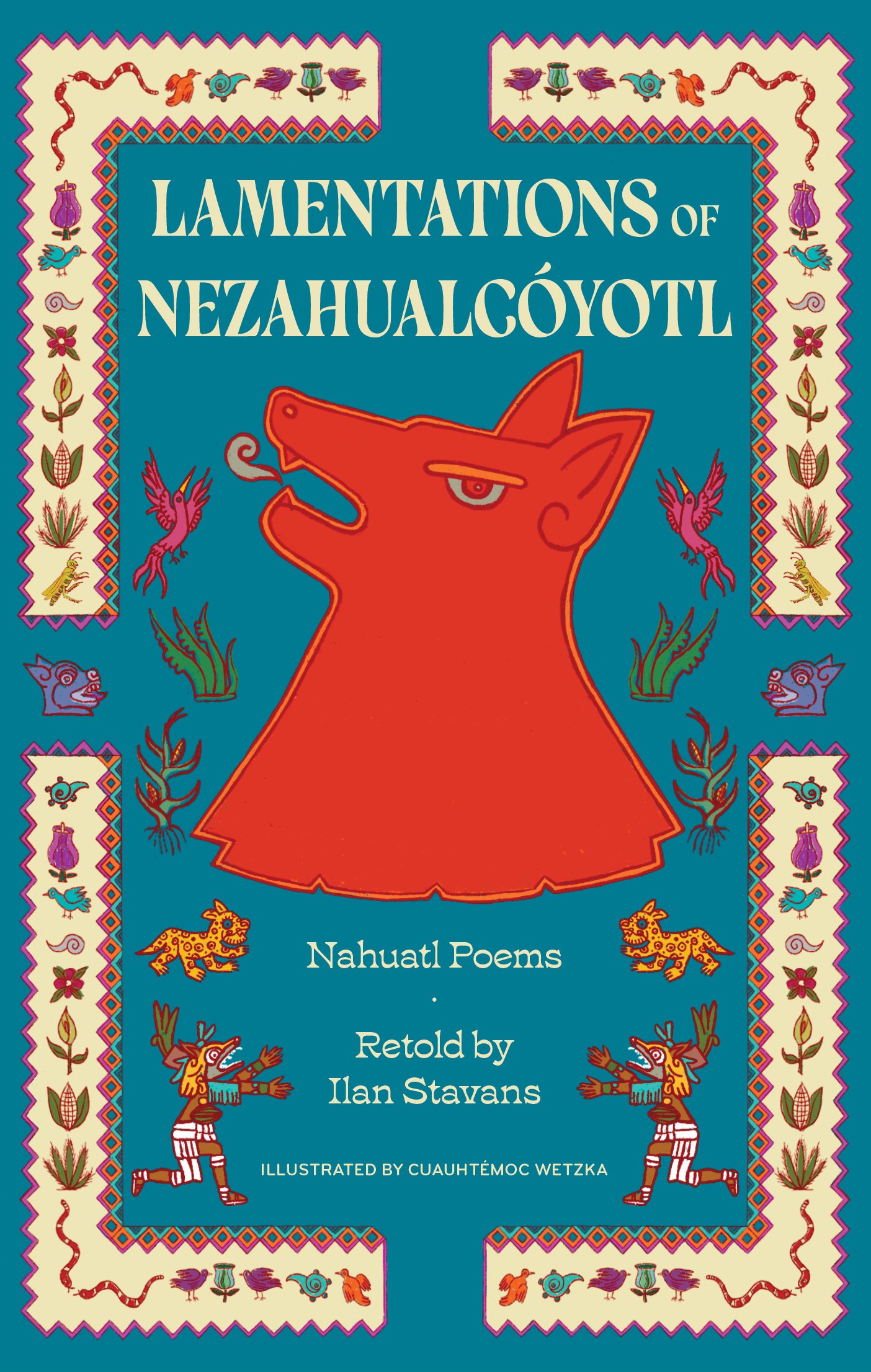By ILAN STAVANS and TERESA VILLEGAS
SACA LA PATA/THE REVERSAL
Un pájaro puso a su dueño en una jaula. “Nuestros papeles se han invertido”, dijo el pájaro. “¡Quiero que cantes!” El dueño se quejó: “Pero yo no sé cantar”. “No importa”, gritó el pájaro. El dueño silbó pero claramente no tenía ningún ritmo. “Prefiero que bailes ante mí”. El dueño bailó sin ninguna gracia. El pájaro se sintió desilusionado. “De cualquier manera te mantendré en la jaula”. Sin embargo, una hora más tarde el pájaro estaba del todo aburrido. “No me había dado cuenta que tener una mascota es como estar en la cárcel. En la medida que controlamos a los demás ellos también nos controlan a nosotros”.
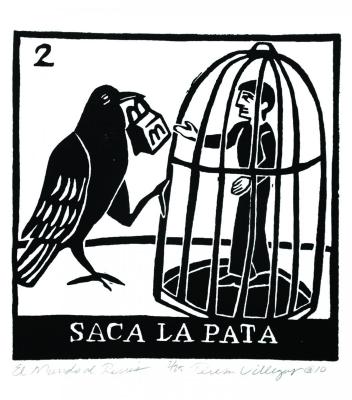 A bird put his owner in a cage. “Our roles have been reversed now,” the bird said. “I want you to sing!” The owner complained, “But I don’t know how to sing.” “It doesn’t matter!” screamed the bird. The owner whistled but it was clear that he was tone deaf. “I would rather you dance for me,” the bird said. The owner danced but without grace. The bird was disappointed. “I’ll keep you in the cage anyway!” However, an hour later the bird was completely bored. “I never realized having a pet was a form of self-imprisonment. When we control others, we allow others to control us.”
A bird put his owner in a cage. “Our roles have been reversed now,” the bird said. “I want you to sing!” The owner complained, “But I don’t know how to sing.” “It doesn’t matter!” screamed the bird. The owner whistled but it was clear that he was tone deaf. “I would rather you dance for me,” the bird said. The owner danced but without grace. The bird was disappointed. “I’ll keep you in the cage anyway!” However, an hour later the bird was completely bored. “I never realized having a pet was a form of self-imprisonment. When we control others, we allow others to control us.”
VAMOS A BAILAR/LET’S DANCE
El oso de circo le dijo al entrenador: “Te envidio. Soy una bestia amaestrada. A los niños les gusta cuando bailo pero yo carezco de toda fuerza. Al contrario, tu eres muy poderoso. Yo hago todo lo que tú me pides”. El entrenador suspiró: “Estás completamente equivocado… Yo sólo soy un tonto que pretende tener control. En realidad, actúo tanto como tú. Si de pronto tú decidieras rugir como alguna vez lo hiciste en la selva, yo huiría inmediatamente”. El oso se emocionó: “Ay, si solamente soñamos y no actuamos terminaremos siendo criaturas sumidas en nuestra propia soledad”.
 The circus bear said to the trainer, “I envy you. I am a tamed beast. Children enjoy my dancing but I no longer project any strength. You instead are mighty powerful! You make me do anything you want.” The trainer sighed. “How mistaken you are … I’m just a fool pretending to be the master. In truth, I perform as much as you do. If you ever decided to roar as you once did in the animal kingdom, I would run away immediately.” The bear was overwhelmed. “Ah, we’re such lonely creatures when we dream instead of act!”
The circus bear said to the trainer, “I envy you. I am a tamed beast. Children enjoy my dancing but I no longer project any strength. You instead are mighty powerful! You make me do anything you want.” The trainer sighed. “How mistaken you are … I’m just a fool pretending to be the master. In truth, I perform as much as you do. If you ever decided to roar as you once did in the animal kingdom, I would run away immediately.” The bear was overwhelmed. “Ah, we’re such lonely creatures when we dream instead of act!”
UNA LIBRA PESA ESTO/THE VALUE OF A HEART
El toro vendía carne en la carnicería . La mercancía era codiciada salvo el corazón. Uno de los clientes explicó: “El corazón humano es muy complicado. Sólo pesa una libra pero pretende ser pesado. Y se rompe fácilmente en mil pedazos”. El toro dijo: “Debes aprender a esconder su sabor: ponle azúcar cuando esté amargo, chile cuando esté frío, córtalo si es grande y úntale crema batida para mantener al corazón contento por si quiere saltar del plato”. El cliente respondió: “Me gusta la sugerencia: el corazón está mejor cuando menos atención recibe”.
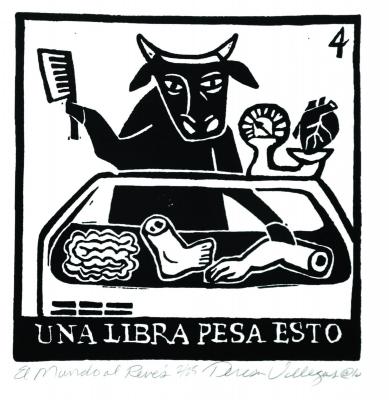 At the butcher’s store, the bull sold meat. His goods were popular except for the heart. A customer explained, “The human heart is too complicated. It weighs only one pound yet it pretends to be heavy. And it breaks too easily into little pieces.” The bull said, “You must learn to hide its flavor: sugar for the bitter heart, chile for the cold heart, a fine dice for the big heart, and heavy cream to keep the joyous heart from leaping off the plate.” The customer replied, “I like that idea: the heart is at its best when ignored.”
At the butcher’s store, the bull sold meat. His goods were popular except for the heart. A customer explained, “The human heart is too complicated. It weighs only one pound yet it pretends to be heavy. And it breaks too easily into little pieces.” The bull said, “You must learn to hide its flavor: sugar for the bitter heart, chile for the cold heart, a fine dice for the big heart, and heavy cream to keep the joyous heart from leaping off the plate.” The customer replied, “I like that idea: the heart is at its best when ignored.”
HOMBRES SALEN/THE SOURCE OF EVIL
Una caja con monedas de oro se hallaba en la playa. Un cangrejo la abrió pero no halló nada de interés. La gaviota aterrizó en su parte superior, husmeó adentro y al no encontrar comida se fue. Un caracol se adhirió a la caja, cayó en sueño y también se fue. Luego vino una niña. Ella sacó las monedas y con ellas construyó un castillo en la arena. Un rato después perdió el interés y las monedas fueron sobrecogidas por la marea. Un pez a quien le gustaba la filosofía, que había puesto la caja allí, reflexionó: “El dinero no es la causa del mal; los adultos lo son”.
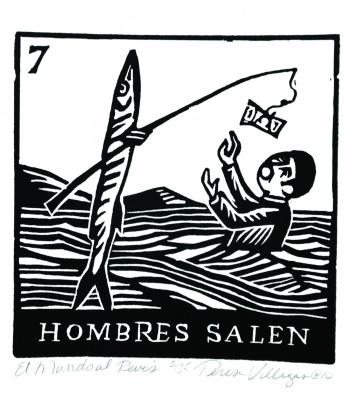 On the beach there was a box with gold coins. A crab opened it but wasn’t interested. A seagull landed on top of it, peeked inside, didn’t find food, and departed. A snail latched onto the box, fell asleep, then woke and left. Then a girl came. She took the coins out and built a castle in the sand. Eventually she too lost interest and the gold coins were washed away by the waves. A fish who liked philosophy, and who had placed the box there himself, thought: “Money isn’t the source of evil, adults are.”
On the beach there was a box with gold coins. A crab opened it but wasn’t interested. A seagull landed on top of it, peeked inside, didn’t find food, and departed. A snail latched onto the box, fell asleep, then woke and left. Then a girl came. She took the coins out and built a castle in the sand. Eventually she too lost interest and the gold coins were washed away by the waves. A fish who liked philosophy, and who had placed the box there himself, thought: “Money isn’t the source of evil, adults are.”
LECHE PARA JÓVENES/A WORLD WITHOUT MIRRORS
Una muchacha sedienta se quedó dormida en la campiña. Un par de vacas pastaban no muy lejos. “Ofrezcámosle un poco de nuestra leche”, dijo una. Cuando la muchacha despertó, se dio un baño de leche mientras se veía en un espejo. Las vacas se percataron de lo que hizo la muchacha y se pusieron furiosas. “Nuestra lecha era para saciar la sed y no para la vanidad”. “¡La sed es pasajera!” replicó la muchacha. “Y si bien es una necedad anhelar la juventud perpetua, no prolongarla es una manera de ceder ante la muerte”. Una vaca miró a la otra: “¡Dichosas nosotras que habitamos en un mundo sin espejos!”
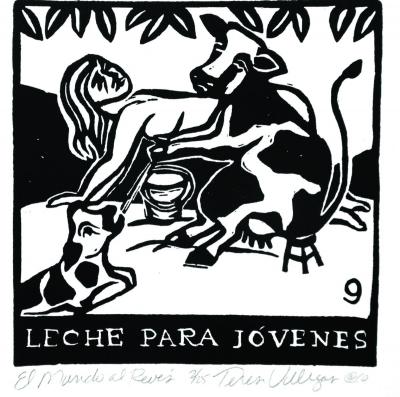 A thirsty maiden fell asleep in a prairie. A pair of cows was grazing nearby. “Let’s offer her some of our milk,” one said. When the maiden woke up, she bathed in the milk while looking at herself in a mirror. The cows saw what the maiden had done and were furious. “Our milk was meant for nourishment, not for vanity.” “Thirst is temporary!” the maiden exclaimed. And while it might be futile to seek perpetual youth, to not prolong it is to give in to death too soon.” One cow looked at the other: “Lucky are we who live in a world without mirrors!”
A thirsty maiden fell asleep in a prairie. A pair of cows was grazing nearby. “Let’s offer her some of our milk,” one said. When the maiden woke up, she bathed in the milk while looking at herself in a mirror. The cows saw what the maiden had done and were furious. “Our milk was meant for nourishment, not for vanity.” “Thirst is temporary!” the maiden exclaimed. And while it might be futile to seek perpetual youth, to not prolong it is to give in to death too soon.” One cow looked at the other: “Lucky are we who live in a world without mirrors!”
QUIETO BÁRBARO/THE MAGICIAN AND THE SKEPTIC
Un escéptico se topó con un mago que le dio una herradura. “Cuélgala patas arriba y te traerá buena fortuna”, dijo el mago. “Pero si inviertes su posición, dejarás de ser quien eres”. El escéptico no confiaba en lo que había escuchado pero colgó la herradura como se lo habían sugerido. Pronto se hizo rico. Un día un sirviente, al limpiar, puso la herradura patas abajo. El escéptico sintió miedo y, como resultado, sintió que perdería el control de sus dominios. El mago apareció otra vez. “¿Dejaré de ser quién soy?” preguntó el escéptico. “Ya lo has hecho…”, le respondió el mago.
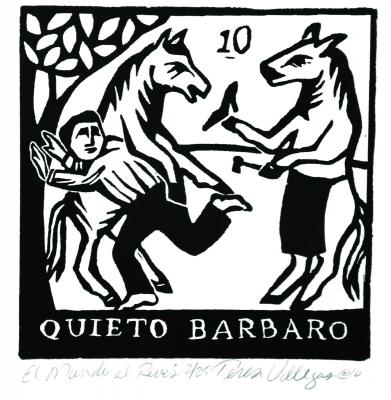 A skeptic came across a magician who gave him a horseshoe. “Hang it with the ends pointing up and it will bring fortune,” the magician said. “But if it turns upside down, you’ll stop being yourself.” The skeptic didn’t believe him yet he hung the horseshoe as he’d been told. He soon became rich. One day a servant, while cleaning, placed the horseshoe upside down. The skeptic became frightened and believed he would lose control of his estate. The magician appeared again. “Will I lose my sense of self?” the skeptic asked. “You already have…,” the magician replied.
A skeptic came across a magician who gave him a horseshoe. “Hang it with the ends pointing up and it will bring fortune,” the magician said. “But if it turns upside down, you’ll stop being yourself.” The skeptic didn’t believe him yet he hung the horseshoe as he’d been told. He soon became rich. One day a servant, while cleaning, placed the horseshoe upside down. The skeptic became frightened and believed he would lose control of his estate. The magician appeared again. “Will I lose my sense of self?” the skeptic asked. “You already have…,” the magician replied.
Ilan Stavans is Lewis-Sebring Professor in Latin American and Latino Culture at Amherst College and the publisher of Restless Books. His latest books are Borges, the Jew (SUNY), Quixote: The Novel and the World (Norton), and Words in Transit: Stories of Immigrants (Massachusetts). He is the editor of All the Odes of Pablo Neruda (Farrar, Straus and Giroux), due out in October.
Teresa Villegas lives and works in Phoenix, Arizona. She is a fine artist, published illustrator, and graphic designer. Literature and language are often incorporated into her work. Her work has exhibited in Mexico and throughout the U.S. To see more of her work, visit www.teresavillegas.com.
[Purchase your copy of Issue 02 here.]



